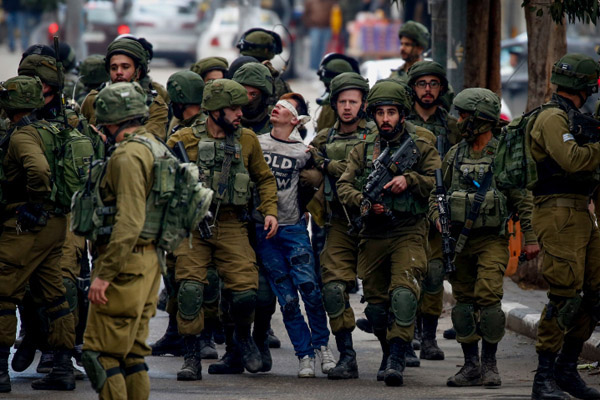A proposed law, said to be supported by Netanyahu’s government, would criminalize videotaping Israeli soldiers doing the dirty work of the occupation. But hiding something from sight doesn’t make it go away. Or does it?

If an Israeli soldier beats a Palestinian and no one is there to catch it on video, did it really happen? That is the question a group of Israeli lawmakers seems determined to find out.
A new bill, proposed by four members of Avigdor Liberman’s far-right Israel Beiteinu party, would make “videotaping, recording, or photographing Israeli soldiers carrying out their duty with the intention of eroding morale” a crime punishable by five years in prison. If the intent is to harm state security, the punishment doubles to 10 years in prison. The law would also apply to those disseminating such documentation.
According to a Haaretz report, the bill was expected to gain the support of the entire government in a vote on Sunday.
Here are three important things to note about this bill.
1. This is an explicit attempt to silence and criminalize the work of Israeli human rights organizations. The bill’s explainer section specifically cites the work of B’Tselem, Machsom Watch, and Breaking the Silence as its impetus. After a decade of going after human rights and anti-occupation groups’ funding, the ability of Israel’s critics to freely travel, and campaigns accusing them of treason, the government may now attempt to criminalize their activities outright.
Whenever despondency starts to set in, whenever the work of human rights and anti-occupation groups seems utterly futile, remember this bill — irrespective of whether it becomes law or is left to die in committee. This bill is a reminder that Israel’s right-wing nationalist government sees those groups’ work as threatening enough that it is constantly looking for ways to marginalize, disparage, and outlaw them and their work. Clearly, exposing the reality of occupation is a threat to the occupation, and by extension, to the current Israeli regime.
2. The law would only apply to Israelis, not Palestinians. Because Israel has not yet annexed the West Bank and therefore rules over Palestinians as non-citizen subjects of its military regime, laws passed by the Knesset do not apply to the 2.8 million Palestinian who live there. (In order for an Israeli law to apply to Palestinians, the commander of Israeli forces in the West Bank would have to add it to the military code that serves as the law for Palestinians.)
The result would be that if a Palestinian and an Israeli are standing right next to each other on the side of a West Bank highway filming the same soldier beating a Palestinian man, only the Israeli would be committing a crime. Of course, Israel doesn’t need any new laws in order to put Palestinians behind bars, especially for publishing things online that catch the ire of its security services: from incitement to violence to administrative detention (imprisonment with no charge or trial), there is no shortage of “legal” tools already at the disposal of Israeli authorities.
3. The bill’s authors are actually onto something. It does harm morale, of IDF soldiers and Israeli civilians alike, to watch one’s comrades and sons carry out the ugly, violent, grunt work of ruling over another people by way of brute force and daily humiliation. The occupation is not a pretty thing — not for its victims and not for its perpetrators. That is basically the raison d’être of the three organizations the bill put in its crosshairs: to make sure that soldiers know they are being seen (Machsom Watch), and to make sure Israelis and the world see what those soldiers are doing (Breaking the Silence and B’Tselem).
Which brings us back to the question of whether a crime that isn’t documented actually took place. In the Israeli public conscious, such a bill might actually prove that the answer is no, at least partially. Most Israelis don’t want to see the violence of the occupation. Out of sight, out of mind, cognitive dissonance, object impermanence — whatever you want to call it, human beings have a plethora of tools for suppressing thoughts that aren’t comfortable to think about. By literally removing from sight the offending images, those mental acrobatics become much easier.
Watch undercover Israeli troops shoot Palestinian youth point blank:
The rest of the world (and a smaller section of Israeli society) is a different story. After half a century of occupation and three decades since American network television began broadcasting videos of Israeli soldiers breaking the bones of Palestinian protesters, the cat is out of the bag. Images of Israeli oppression and violence against Palestinians has long been seared into the minds of millions of people around the world.
If those images suddenly stop being shared at the frequency with which they occur, people will not conclude it is because the occupation ended or because it became a benevolent and kind military dictatorship overnight. No, they will understand why those images stopped coming: because even far-right, hyper-nationalist Israelis realize that the occupation is morally repugnant and corrosive to their own society, but that the only remedy they have for that problem is to cover their eyes.

